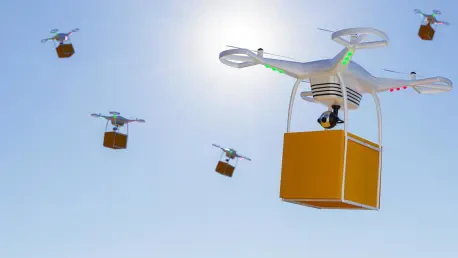In a groundbreaking initiative to redefine retail logistics, Walmart has strategically expanded its drone delivery service, sparking notable advancements and discussions within the retail sector. This expansion marks a partnership with Wing, a subsidiary of Alphabet, which has set Walmart on a course to explore this transformative delivery method across five new urban markets. This initiative is not merely a new endeavor; it forms part of Walmart’s commitment to integrate advanced technology to enhance customer convenience and expedite their shopping experience.
The Rise of Drone Delivery Technology
Drone delivery has quickly emerged as a pivotal innovation, fundamentally changing how goods are transported from retailer to consumer. At its core, this technology leverages Unmanned Aerial Vehicles (UAVs), sophisticated navigation systems, and consumer-centric logistics to transcend traditional delivery barriers. Urban centers are increasingly exposed to this delivery method that promises unmatched speed and efficiency, meeting the technological demands of the modern retail environment.
Unmanned Aerial Vehicles in Action
At the heart of the drone delivery revolution are Unmanned Aerial Vehicles. These drones are engineered to cover significant distances in a matter of minutes, offering an unprecedented level of convenience by reducing delivery times drastically. Functioning autonomously, these UAVs are equipped with sensors and cameras, allowing them to navigate complex urban landscapes efficiently. The importance of these vehicles cannot be understated, as they serve as the backbone of this delivery network.
Advanced Navigation and Control: Precision and Performance
Modern drone delivery systems are heavily reliant on advanced navigation technology. These systems employ GPS, artificial intelligence, and machine learning algorithms to optimize flight paths and ensure accurate deliveries. This technology is crucial not just for efficient operation but also for enhancing safety and reliability in urban settings, where navigational challenges are more pronounced. Real-world usage consistently underscores the capability of these drones to meet demanding logistics requirements.
Innovations and Emerging Trends
Recent developments in drone technology highlight significant shifts that are shaping the future of retail logistics. Consumer behavior has adapted with this technology, showing a preference for swift delivery of essential goods. Additionally, industry trends indicate a growing emphasis on improving drone payload capabilities and extending their range, aiming to address broader consumer needs. These advancements reflect a strategic response to the competitive landscape and demand for innovation-driven solutions.
Practical Implementations Across Industries
Drone delivery’s real-world applications have been profound. Walmart’s extended service sees drones operating effectively in delivering essential goods like groceries and health supplies. This service offers convenience in acquiring last-minute essentials, adjusting consumer behavior toward a more instant gratification model in retail. Distinct implementations have emerged within urban sectors, showcasing the adaptability and potential reach of drone technology.
Overcoming Challenges and Hurdles
Despite its promise, drone delivery technology faces a series of challenges. Regulatory landscapes present significant hurdles, with airspace control and safety as primary concerns. Additionally, technological limitations such as battery life and payload capacity continue to be bottlenecks in achieving expansive use. Nonetheless, ongoing developments focus on overcoming these obstacles, with gradual policy changes and technological breakthroughs anticipated to facilitate broader adoption.
Looking Ahead: The Future of Drone Deliveries
The future outlook for drone delivery is marked by optimism and intense innovation. Industry experts anticipate breakthroughs in AI integration, enhancing navigational precision and expanding operational capacities. These advances are expected to drive significant improvements in delivery efficiency. Furthermore, as consumer attitudes continue to shift toward immediacy, the retail landscape is poised for further tech-driven transformation, with drone delivery playing a central role.
Evaluating the Impact
Walmart’s strategic expansion into drone delivery has redefined expectations for logistics and retail innovation. The endeavor has set a new standard for delivery speed and customer satisfaction, highlighting the potential of drones to revolutionize the sector. Despite facing the typical barriers that come with the adoption of new technology, Walmart’s initiative has laid the groundwork for efficiency and convenience in the retail industry, positioning drones as a pivotal component of future logistics solutions.









